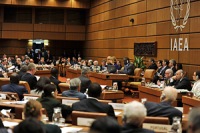A contribution of $10 million from Kuwait has advanced the concept of an international nuclear fuel cycle. A target of $150 million in commitments has been met.
 |
| The ongoing IAEA board meeting (Image: IAEA/D.Calma) |
Five international contributors responded to the NTI's challenge, committing a total of $107 million between them: the European Union, Norway, the United Arab Emirates, the USA and now Kuwait, which announced its move in Vienna today. The NTI's pledge now comes into effect taking the overall sum, meant to 'kick-start' the project, to $157 million.
There is no firm plan, but a 'nuclear fuel bank' would essentially take the form of supply guarantees based on a stockpile of low-enriched uranium managed by the International Atomic Energy Agency (IAEA).
Although several proposals have been made, by countries as well as industry through the World Nuclear Association, a decision on how - or whether - to go forward remains. Ideas range from a full-scale IAEA-managed fuel production facility in an extranational territory, to a system of guarantees from existing commercial nuclear fuel companies. All of them involve some sort of IAEA arbitration based on compliance with safeguards commitments.
Mohamed ElBaradei, director general of the IAEA, said that the next step would be to develop a proposed framework for the fuel reserve and present it to the IAEA board for consideration in June.
The concept of a fuel bank has been strongly supported by ElBaradei, who has said it is necessary for the serious expansion of nuclear power in future. The purpose is that guarantees of supply would dissuade individual countries from pursuing their own nuclear fuel production capability, some elements of which can be abused to create nuclear weapons.
A case in point is that of Iran, where uranium enrichment programs began outside the view of the IAEA. Iran has always said that the purpose was to make fuel for its forthcoming power reactor at Bushehr, but the hidden nature of the early stages of the project raised concerns that will not go away.
Besides enriched uranium, a comprehensive guarantee scheme would also have to cover supply of finished reactor fuel for the exact fuel assembly designs in use today. And a fuel bank to avoid situations like the current Iranian issue would beg the question of what the world would do if a country decided to develop its own enrichment plants despite supply assurances.
Head of the World Nuclear Association John Ritch said, "Creating a fuel bank system offers many challenges, but none more fundamental than the question of purpose. Countries not suspected of nuclear arms ambitions already have good access to commerce in nuclear fuel; do they need fuel assurances? As to countries that may harbor weapons ambitions, will they heed fuel assurances – that is, will the existence of a fuel bank alter their behavior in any way?"














